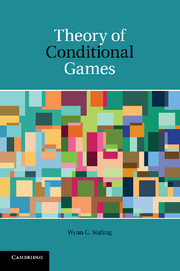8 - Conclusion
Published online by Cambridge University Press: 05 January 2012
Summary
Knowledge is widely taken to be a matter of pedigree. To qualify as knowledge, beliefs must be both true and justified. Sometimes justification is alleged to require tracing of the biological, psychological, or social causes of belief to legitimating sources. Another view denies that causal antecedents are crucial. Beliefs become knowledge only if they can be derived from impecable first premises according to equally noble first principles. But whether pedigree is traced to origins or fundamental reasons, centuries of criticism suggest that our beliefs are born on the wrong side of the blanket. There are no immaculate preconceptions.
Where all origins are dark, preoccupation with pedigree is self-defeating. We ought to look forward rather than backward and avoid fixation on origins.
– Isaac Levi The Enterprise of Knowledge (MIT Press, 1980)Game theory has a great pedigree. To many, it is viewed as settled knowledge. In particular, the basic assumptions of categorical preference orderings and individual rationality have remained intact since the inception of the theory. Given these assumptions, the bulk of attention has focused on defining various solution concepts that conform to the rationality assumptions, including minimax theory, notions of equilibrium, coalition formation, principles of uncertainty, and analysis of repeated games. A fairly recent focus of interest has been advanced by the field of behavioral economics, which attempts to imbue games with greater psychological realism (for example, accounting notions of fairness and reciprocity).
- Type
- Chapter
- Information
- Theory of Conditional Games , pp. 209 - 215Publisher: Cambridge University PressPrint publication year: 2011



